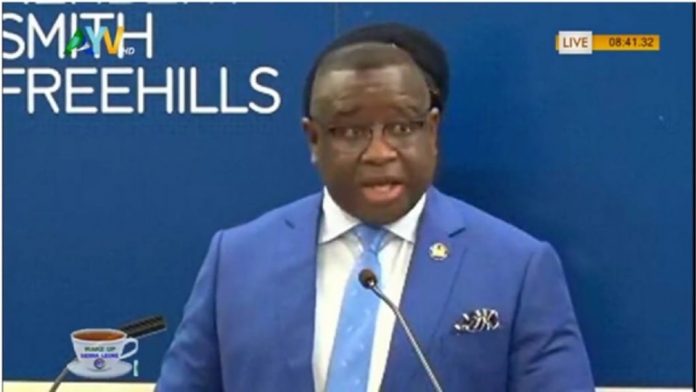Expressing his dogged commitment to combat graft, President Julius Maada Bio of Sierra Leone has reiterated his Government’s resolve to fight corruption in order to make this country more attractive to foreign investment.
“We inherited an economy burdened with debt in which corruption was rife,” he said at the UK-Sierra Leone Trade and Investment Forum in London last week.
“The IMF and the World Bank, among others, had abandoned the country.
“The pace of new investments stalled and the iron ore mines especially ceased production as murky deals unravelled.
“So, before and when we acceded to power, we asked ourselves questions about what business and investors would like us to get right,” President Bio added.
He won last year’s presidential election for the Sierra Leone People’s Party (SLPP) against the All Peoples Congress (APC).
A Government Transition Team discovered widespread corruption and cronyism under the APC.
The new government asked the African Organisation of English-speaking Supreme Audit Institutions to help carry out a forensic audit of the financial activities of the APC government.
A team of 43 auditors from Ghana, Kenya and Tanzania, working with the Sierra Leone Audit Service, spent a month scrutinising the national social security agency and the energy, telecoms and civil works sector, covering the period – January 2016 to July 2018.
The auditors reported that US$1 billion could not be accounted for.
President Bio told the London investment forum that his government was now clamping down on corruption.
“But it’s a continuous fight because corruption has a way of fighting back.”
His government started off with getting the macroeconomics right.
“We clamped down on out-of-control spending; closed off leakages for fraud, waste, and abuse of public funds; and we have clamped down on corruption.
“In the ratings on corruption by the Millennium Corporation Challenge, we moved from 47 points to 71 points on the scorecard for the control of corruption,” President Bio said.
“We believe that clamping down on corruption is good for governance, good for the economy, and especially good for business.
“It cuts out unnecessary red tape, corruption, and unpredictability about registering and doing business and there is less likelihood of predatory businesses thriving in the same economic space.
“The IMF and World Bank have re-established working relationships with Sierra Leone and their assessment indicates that we continue getting the macroeconomic fundamentals right. “To us, fiscal discipline, controlling corruption, and a responsible management of our economy are good for business,” he added.
In a country that sees 100,000 young people enter the jobs market each year, President Bio said there was an urgent need to expand and diversify the economy “in order to make it more resilient”.
“We believe it takes private capital to do that and lots of it too,” he added.
“We have developed a medium-term national development plan that is pro-growth and encourages private capital investment in key priority areas in agribusiness and fisheries, tourism, infrastructure, and renewable energy.”
President Bio said that his government had introduced reforms that were now making registering a business corruption-free and less cumbersome.
“No more endless forms, bribes to dodgy middle men and facilitators, and tortuous process that often end in frustration,” he said.
As a result, he said, the number of businesses registered in the last year had doubled and “we have seen an upward tick in Sierra Leone’s Starting a Business Indicator and that of Protecting Minority Investors under the World Bank Ease of Doing Business Report 2019”.
Apart from these indicators, the country now has its first National Corporate Governance code to improve transparency and accountability.
It has adopted global best practices and trends that improve the investment climate in countries around the world.
President Bio said that in line with Sustainable Development Goal 5, which calls for effective participation of women in leadership, all boards in Sierra Leone must now have a minimum of 30 per cent female representation.
“We are listening to business and we will continue acting to make business easy for business,” President Bio told the forum.
“We are eager to cultivate a culture of trust and confidence around investing in Sierra Leone.
“We want our potential investors to know that we are looking for credible partners who are interested in a sustainable, long-term, win-win relationship where they know that their investments are protected by a government that truly cares about business and they are able to make good returns on their investments,” he added.
Held at the offices of international law firm Herbert Smith Freehills (HSF), the forum was oversubscribed, according to the organisers, Development Markets Associates.
Since 2010, HSF’s Fair Deal Sierra Leone has provided £7 million of pro bono advice to the government of Sierra Leone on matters relating to foreign direct investment.




